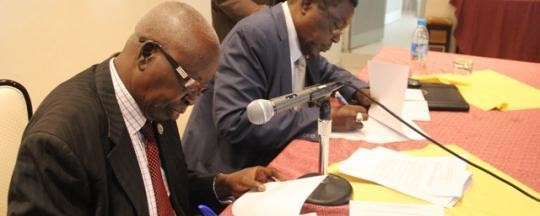The Jieng Council of Elders, a group of influential Dinka politicians and relatives of President Salva Kiir, has welcomed the division of South Sudan’s ten states into 28 new ones, describing the recent Establishment Order as a response to a historical demand of the people of South Sudan.
Ambrose Riiny Thiik, the former chief justice and now chair of the Dinka Council of Elders said in an interview on Monday that the Establishment Order would help bring more services to the people and is a win-win for both of the warring parties that signed the August peace deal.
“We are saying at the Council that the creation of more administrative units will not be a cure all solution to political problems that are there but it can be a win-win for all the parties in this conflict.”
He cited Unity state and Upper Nile states where there are fears among government supporters and allied militia that there could be another conflict if the agreement is implemented without taking into consideration the views of the people who fought in defense of the government. The peace deal had given majority rule in those states to the opposition.
“There is nothing wrong with creation of more states, more counties and more other administrative units. This is the policy of the government and it is in line with the demand of the people of South Sudan. The primary objective is to take services close to the people and involve them in decision making process on issues which matters to them.”
Ambrose said, “We should congratulate the President and embrace the Order, own it and implement it because this has been a long demand of our people.”
For his part, Aldo Deng Akuey, chairman of the parliamentary committee on legal affairs at the Council of States and a member of the Dinka Council of Elders, said there is nothing wrong with the creation of more administrative units.
He defended the new system against charges of racism, pointing out that some counties have always been exclusively inhabited and administered by one ethnic group.
“Was this tribalism? No. There was nothing tribalist in creating more states and more counties. Actually, most of the counties have previously been exclusively run by one ethnic group and even if you look at how colonial districts were established, you find they were based on tribal settings. So there is nothing to blame the president and his government,” said Aldo.
But Lam Akol, leader of the national alliance of South Sudanese political parties outside the government described the Establishment Order as “a flagrant violation of the constitution.”
The opposition leader explained that the 2011 Transitional Constitution stipulates that it is the Council of States that initiates legislation on decentralization. He said that presidential orders cannot be issued on matters affecting the Bill of Rights or the decentralized system.
Related coverage:
Ambrose Riny Thiik denies having fueled war (10 Sept.)
Dinka Council of Elders belatedly welcomes Kiir’s signature for peace (9 Sept.)




